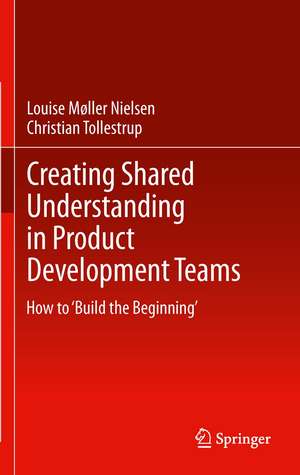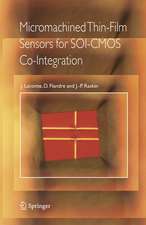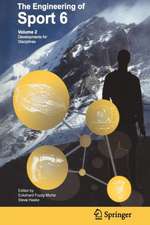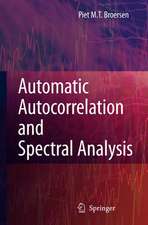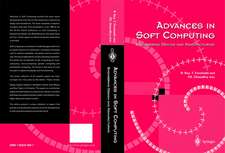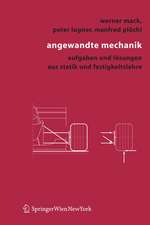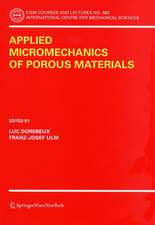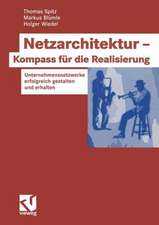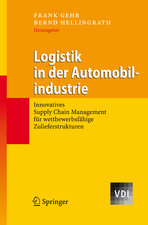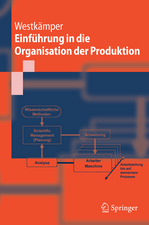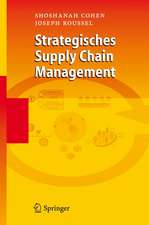Creating Shared Understanding in Product Development Teams: How to ‘Build the Beginning’
Autor Louise Møller, Christian Tollestrupen Limba Engleză Paperback – 20 sep 2014
Encompassing both the participant’s and the facilitator’s point of view, Creating Shared Understanding in Product Development Teams: How to ‘Build the Beginning’ provides both practical examples and theoretical explanation for the process of creating shared understanding. This book provides a toolbox and a practical guide for planning, executing, and facilitating workshops. The result is a clear outline of how to facilitate the creation of physical artifacts that enables and stimulates communication between team members, users, and stakeholders in order to create shared understanding of projects
| Toate formatele și edițiile | Preț | Express |
|---|---|---|
| Paperback (1) | 633.19 lei 43-57 zile | |
| SPRINGER LONDON – 20 sep 2014 | 633.19 lei 43-57 zile | |
| Hardback (1) | 637.59 lei 43-57 zile | |
| SPRINGER LONDON – 9 aug 2012 | 637.59 lei 43-57 zile |
Preț: 633.19 lei
Preț vechi: 744.93 lei
-15% Nou
Puncte Express: 950
Preț estimativ în valută:
121.20€ • 131.69$ • 101.87£
121.20€ • 131.69$ • 101.87£
Carte tipărită la comandă
Livrare economică 21 aprilie-05 mai
Preluare comenzi: 021 569.72.76
Specificații
ISBN-13: 9781447161257
ISBN-10: 1447161254
Pagini: 148
Ilustrații: XIV, 134 p.
Dimensiuni: 155 x 235 x 8 mm
Greutate: 0.22 kg
Ediția:2013
Editura: SPRINGER LONDON
Colecția Springer
Locul publicării:London, United Kingdom
ISBN-10: 1447161254
Pagini: 148
Ilustrații: XIV, 134 p.
Dimensiuni: 155 x 235 x 8 mm
Greutate: 0.22 kg
Ediția:2013
Editura: SPRINGER LONDON
Colecția Springer
Locul publicării:London, United Kingdom
Public țintă
Professional/practitionerCuprins
Theoretical Foundation.- Methodology & Material.- Analysis and Findings I.- Analysis and Findings II.- Analysis and Findings III.
Notă biografică
Louise Møller Nielsen holds a MSc.Eng in Industrial Design, a PhD in Design andInnovation, and is currently Assistant Professor at Department of Architecture, Design and Media Technology, Aalborg University, Denmark. Her present research is concerned with the early phases of design and innovation, user-centred-design and interdisciplinary teams. She has planned and facilitated workshops to?in private companies (Daimler AG, The Red Crods, TC Electronic, and Catapult Design among others), in the Danish social- and healthcare sector and for post graduate students both at Aalborg- and Stanford University. Besides her research and teaching at Aalborg University, she has also worked as project manager and workshop facilitator at the consultancy Copenhagen Living Lab.
Christian Tollestrup, holds a cand.arch. in Industrial Design and a Ph.D. in Value and Viosion-based concept development, and is currently working as Associate Professor at Department of Architecture, Design and Media Technology, Aalborg University. His present research is concerned with user-driven innovation, workshop management, and design based entreprenurship. Christian Tollestrup has 10 years' experience in planning and facilitating design and innovation workshops for Post Graduate students at Aalborg University. Since 2008 he has co-planned and facilitated large scale, annual innovation and entrepreneurship workshops for 400 Post Graduate Students in interdisciplinary teams at Aalborg University, a series of workshops on ”Danish Production 2025” involving companies such as LEGO, Danfoss, and Grundfoss as well as a series of employee-driven-innovation workshops for the healthcare sector.
Christian Tollestrup, holds a cand.arch. in Industrial Design and a Ph.D. in Value and Viosion-based concept development, and is currently working as Associate Professor at Department of Architecture, Design and Media Technology, AalborgUniversity. His present research is concerned with user-driven innovation, workshop management, and design based entreprenurship. Christian Tollestrup has 10 years' experience in planning and facilitating design and innovation workshops for Post Graduate students at Aalborg University. Since 2008 he has co-planned and facilitated large scale, annual innovation and entrepreneurship workshops for 400 Post Graduate Students in interdisciplinary teams at Aalborg University, a series of workshops on ”Danish Production 2025” involving companies such as LEGO, Danfoss, and Grundfoss as well as a series of employee-driven-innovation workshops for the healthcare sector.
Christian Tollestrup, holds a cand.arch. in Industrial Design and a Ph.D. in Value and Viosion-based concept development, and is currently working as Associate Professor at Department of Architecture, Design and Media Technology, Aalborg University. His present research is concerned with user-driven innovation, workshop management, and design based entreprenurship. Christian Tollestrup has 10 years' experience in planning and facilitating design and innovation workshops for Post Graduate students at Aalborg University. Since 2008 he has co-planned and facilitated large scale, annual innovation and entrepreneurship workshops for 400 Post Graduate Students in interdisciplinary teams at Aalborg University, a series of workshops on ”Danish Production 2025” involving companies such as LEGO, Danfoss, and Grundfoss as well as a series of employee-driven-innovation workshops for the healthcare sector.
Christian Tollestrup, holds a cand.arch. in Industrial Design and a Ph.D. in Value and Viosion-based concept development, and is currently working as Associate Professor at Department of Architecture, Design and Media Technology, AalborgUniversity. His present research is concerned with user-driven innovation, workshop management, and design based entreprenurship. Christian Tollestrup has 10 years' experience in planning and facilitating design and innovation workshops for Post Graduate students at Aalborg University. Since 2008 he has co-planned and facilitated large scale, annual innovation and entrepreneurship workshops for 400 Post Graduate Students in interdisciplinary teams at Aalborg University, a series of workshops on ”Danish Production 2025” involving companies such as LEGO, Danfoss, and Grundfoss as well as a series of employee-driven-innovation workshops for the healthcare sector.
Textul de pe ultima copertă
Development projects that span different disciplines and groups often face problems in establishing a shared understanding of the project’s purpose, deliverables, and direction. Creating Shared Understanding in Product Development Teams: How to ‘Build the Beginning’ uses research-based cases from TC Electronic, The Red Cross, Daimler AG, and Copenhagen Living Lab to demonstrate one approach to this problem complex. It shows how prototyping specific physical artifacts can function as drivers and focal points for creating the much needed shared understanding.
Encompassing both the participant’s and the facilitator’s point of view, Creating Shared Understanding in Product Development Teams: How to ‘Build the Beginning’ provides both practical examples and theoretical explanation for the process of creating shared understanding. This book provides a toolbox and a practical guide for planning, executing, and facilitating workshops. The result is a clear outline of how to facilitate the creation of physical artifacts that enables and stimulates communication between team members, users, and stakeholders in order to create shared understanding of projects
Encompassing both the participant’s and the facilitator’s point of view, Creating Shared Understanding in Product Development Teams: How to ‘Build the Beginning’ provides both practical examples and theoretical explanation for the process of creating shared understanding. This book provides a toolbox and a practical guide for planning, executing, and facilitating workshops. The result is a clear outline of how to facilitate the creation of physical artifacts that enables and stimulates communication between team members, users, and stakeholders in order to create shared understanding of projects
Caracteristici
Counters the waste of project resources due to ambiguity and lack of real shared understanding in the team by prototyping the project point of departure Provides hands-on tools to involve users and enable the entire team to identify the right user need and scope of the project from the start Forms a facilitation guide that not only describes and exemplifies the methods, but also provides readers with input and inspiration to plan, instruct and facilitate workshops Includes supplementary material: sn.pub/extras
